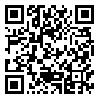Volume 8, Issue 1 (1-2020)
J. Pediatr. Rev 2020, 8(1): 15-22 |
Back to browse issues page
Download citation:
BibTeX | RIS | EndNote | Medlars | ProCite | Reference Manager | RefWorks
Send citation to:



BibTeX | RIS | EndNote | Medlars | ProCite | Reference Manager | RefWorks
Send citation to:
Motaharifard M S, Effatpanah M, Nejatbakhsh F. Nocturnal Enuresis in Children and Its Herbal Remedies in Medieval Persia: A Narrative Review. J. Pediatr. Rev 2020; 8 (1) :15-22
URL: http://jpr.mazums.ac.ir/article-1-222-en.html
URL: http://jpr.mazums.ac.ir/article-1-222-en.html
1- Department of Persian Medicine, School of Persian Medicine, Tehran University of Medical Sciences, Tehran, Iran.
2- School of Medicine, Ziaeian Hospital, International Campus, Tehran University of Medical Sciences, Tehran, Iran.
3- Department of Persian Medicine, School of Persian Medicine, Tehran University of Medical Sciences, Tehran, Iran. ,nejatbakhsh@tums.ac.ir
2- School of Medicine, Ziaeian Hospital, International Campus, Tehran University of Medical Sciences, Tehran, Iran.
3- Department of Persian Medicine, School of Persian Medicine, Tehran University of Medical Sciences, Tehran, Iran. ,
Abstract: (8219 Views)
Context: Nocturnal Enuresis (NE) refers to intermittent involuntary voiding during sleep in a child aged five years or more without any other urinary tract symptoms. Although pharmacological interventions are useful, the NE of most children relapses after the medication is discontinued. Persian Medicine (PM), as an complementary and alternative medicine, offers some useful herbal remedies to manage this disorder. This study aimed to introduce the most common medicinal plants used in Iranian Traditional Medicine (ITM) for the treatment of NE in children.
Evidence Acquisition: In this study, we collected and classified the information about nocturnal enuresis in the old reliable Persian medical texts. Then the achieved information was compared with contemporary medical findings in credible published articles.
Results: NE is a well-known disorder mentioned in PM. Lifestyle modification, in addition to herbal, animal, and mineral medicines, have been used to treat NE; however, most remedies have focused on medicinal herbs. In our investigation, 29 plants were used in ITM as the most frequently used herbs for the treatment of NE in children. These therapeutic herbs were used alone or in combination with other compounds in various forms. Most of them control NE with their anticholinergic and antispasmodic effects. Through literature review, it was found that few studies have investigated the utilization of these plants in children with enuresis.
Conclusion: Despite the vast use of these herbs in PM, evidence of their effectiveness in children with enuresis is not strong, so clinical trials and pharmacological tests are required to evaluate safety and efficacy of these herbal remedies.
Evidence Acquisition: In this study, we collected and classified the information about nocturnal enuresis in the old reliable Persian medical texts. Then the achieved information was compared with contemporary medical findings in credible published articles.
Results: NE is a well-known disorder mentioned in PM. Lifestyle modification, in addition to herbal, animal, and mineral medicines, have been used to treat NE; however, most remedies have focused on medicinal herbs. In our investigation, 29 plants were used in ITM as the most frequently used herbs for the treatment of NE in children. These therapeutic herbs were used alone or in combination with other compounds in various forms. Most of them control NE with their anticholinergic and antispasmodic effects. Through literature review, it was found that few studies have investigated the utilization of these plants in children with enuresis.
Conclusion: Despite the vast use of these herbs in PM, evidence of their effectiveness in children with enuresis is not strong, so clinical trials and pharmacological tests are required to evaluate safety and efficacy of these herbal remedies.
Type of Study: Narrative Review |
Subject:
Traditional Medicine
Received: 2019/01/3 | Accepted: 2019/06/1 | Published: 2020/01/1
Received: 2019/01/3 | Accepted: 2019/06/1 | Published: 2020/01/1
Send email to the article author
| Rights and permissions | |
 |
This work is licensed under a Creative Commons Attribution-NonCommercial 4.0 International License. |









